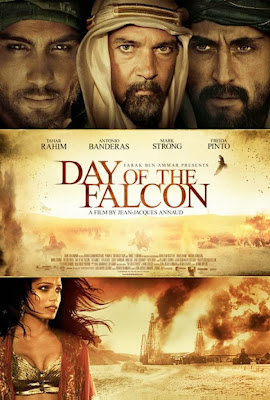The original title --
Black Gold -- of the film under consideration here has been used at least eight times already, even as recently as 2011. So, given the cliché factor and the addition of over-use, the change to something else was a smart move, even if the resulting
DAY OF THE FALCON doesn't exactly set one's heart to racing. "Black gold," of course, refers to
oil, as is the case in a half-dozen of these films, though in one of them it means
coffee, while another creatively combines oil with a
horse.
First seen in 2011, the film made its VOD debut in the USA this past February and had a slight theatrical release the following month. Now, here it is on
Netflix streaming and worth seeing for a number of reasons, beginning with its director,
Jean-Jacques Annaud (shown at right), a man who has given us over the past 37 years not that many but mostly good movies, and who knows his way around intelligent, exotic (to those of us in the west) spectacles like the Oscar-winning
Black and White in Color,
Quest for Fire,
The Name of the Rose and
Enemy at the Gates, to name but four of his dozen films.
This new one -- set in Arabia at the beginning of the 20th Century and adapted by Annaud and his oft-time collaborator
Alain Godard (from the novel
Arab by
Hans Ruesch) with a decent screenplay in English by
Menno Meyjes -- tells the tale of two Arab tribal heads who, rather than fighting over a large plot of desert land, agree to keep it between them as a kind of unused no-man's-land, with the additional obligation that the Sultan (played by
Mark Strong, above) will turn over his two sons to the Emir (
Antonio Banderas, below) to be raised along with the Emir's own son and daughter.
How this is exactly "fair" (what does the Emir give in return?) escaped me, but if you can accept this beginning, the rest of the film unfurls pretty seamlessly, with -- once oil is discovered (below) in this no man's land -- plenty of spectacle, battles, thrills, suspense, surprises (my favorite is how one finds fresh drinking water in the ocean!), along with enough intelligence to make the themes and events shown from a century ago quite timely and thought-provoking for today's world.
First off, who is the villain and who the hero? Both "kings" are shown to be bright but hypocritical in a number of ways. In the movie's depiction of Islam and tradition, we see conventional wisdom and forward thinking both come a-cropper at various times.
The most important plot thread is the growth and change of the Sultan's younger son (another fine performance by
A Prophet's
Tahar Rahim, at left), who goes from a bookish, eye-glassed librarian to a powerful warrior chief in such a way that you thoroughly believe the entire process. Along the way, he must marry the Emir's daughter (the lovely
Freida Pinto, below), whom he indeed loves, and find a way to live with and show decency and honor to those who have betray-ed him and his family. How and why this hap-pens makes for a more intelligent spectacle that you might expect.
We also get interesting views of Islam as a thing that both holds humanity back and offers it a code for living. "God hates what we do to each other in his name," a character notes along the way. And there's a particular death scene mid-movie that uses the religion's tenants in a manner that nearly brought tears to the eyes of this particular atheist.
Above all this, even, what I found most interesting in the movie is its use of oil as the agent for change, and how it affects all concerned. There's a lot of truth here, and most of it is unfortunate. Notes the Sultan, toward the close of events, "When the foreigners (
yes, you can read America in this) finally leave, we will not recognize ourselves."
In the supporting cast are good turns from the talented
Riz Ahmed and a gorgeous, charismatic actress named
Liya Kebede. All in all, the movie proves that there is still a good deal of life, not to mention intelligence, left in some of those Arabian desert spectacles. Regarding that oil, you may leave the movie, wishing as I did,
If only...
A co-production of France, Italy, Qatar and Tunisia,
Day of the Falcon is available now via Netflix streaming, on DVD, and elsewhere, as well.












































